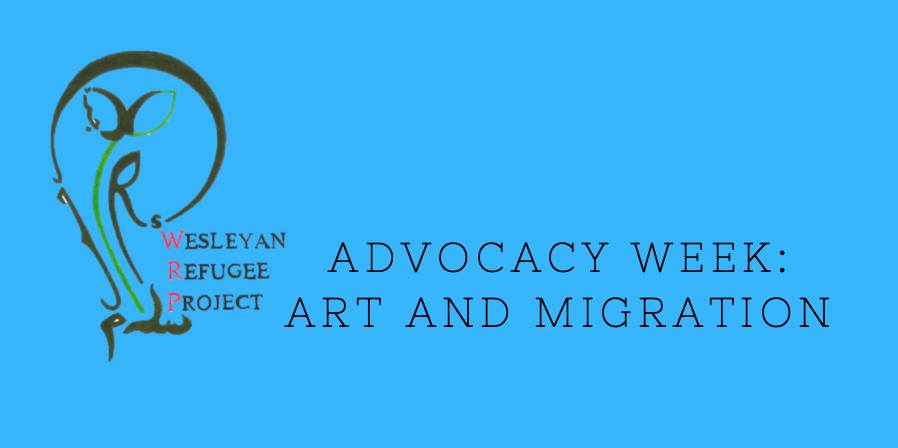
The Wesleyan Refugee Project (WRP) is hosting its second annual Advocacy Week. The week, which is centered around the theme of “Art and Migration,” will feature a series of events exploring advocacy and activism, the portrayal of refugees in the media, and art as both a form of advocacy and exploitation. The week runs until Saturday, culminating in a fundraising raffle. All proceeds raised throughout the week, including donations collected by Star and Crescent, will go to the Multifaith Alliance for Syrian Refugees, which sends shipping containers of aid to Syria.
The WRP, founded in the fall of 2015, partners with local and international groups to help refugees and displaced people around the world. Advocacy Week serves as a way to educate the campus community about refugee struggles and the WRP’s work. The theme of this year’s Advocacy Week, which focuses on the media’s power to define and present the refugee debate, originated from the group’s internal discussions about how best to talk about refugees. The WRP chose this theme in part due to feedback the group received on an event hosted in the fall of 2018: a screening of Ai Weiwei’s “Human Flow.”
“People were coming up to us, and they were having mixed thoughts about the movie and the artist’s intentions,” Co-Chair of the WRP’s Advocacy Team Libby Salzman-Fiske ’19 said. “We came together and were like, ‘This would be a really interesting going-off point for our week.’ We worked with lots of artists in the past but never looked at art critically.”
On Tuesday, April 23, Mohamad Hafez, an artist and architect originally from Syria, and Visiting Assistant Professor of Dance Joya Powell, who explores migration and diaspora through dance, will serve on a panel discussing art as a way of expressing and challenging conversations about immigration.
“How do we depict refugees and displaced people?” Co-Chair of the WRP’s Advocacy team Jake Multer ’20 said, referring to the themes of the panel. “Is this a crisis? Is this not? Who gets to make this art and how can this art be made that is empowering and not exploitative?”
The WRP has increasingly started to shift its attention towards the southern border, where the importance of using the correct immigration terminology takes on serious legal ramifications. As the Trump administration has enacted hard-line policies on the border, the rhetoric used to describe immigrants has shifted from terms like “asylum seekers” to “migrants.”
“‘Migrants’ sends a different connotation than if you call them ‘asylum seekers,’” Co-Chair of the WRP’s Advocacy team Thafir Elzofri ’19 said. “By calling them ‘migrants,’ in my opinion, it releases the U.S. of any required process that they have to go through in International Law, because if someone is an asylum seeker, they have to go through this process that is recognized by every country in the world and so placing a label really does matter. There’s a legal consequence of the terminology we use.”
In conjunction with the Wesleyan Chapter of ACLU Connecticut, WRP is hosting a “Know Your Rights” event on Tuesday in Usdan 108 from 12:15 to 1 p.m. Students will be provided with potential scenarios regarding how to interact with government agencies, such as the U.S. Immigration and Customs Enforcement (ICE).
The Trump administration has also indirectly disrupted some of WRP’s activities, restricting the work non-governmental organizations (NGOs) can do to resettle Afghani and Iraqi refugees who worked for the U.S military. The WRP has, in previous years, worked with an NGO called the International Refugee Assistance Project (IRAP) to help refugees get in contact with former military employers, in order to receive a letter of recommendation for a resettlement package. The Trump administration has banned NGOs from performing this kind of work, according to Multer. As of February 2019, no Afghani applicants of the Special Immigrant Visas had been funded.
“We used to work with IRAP to do casework helping former Afghani and Iraqi refugees who had worked with the U.S. military resettle to the U.S. We used to help in various ways to help bolster their cases,” Multer said. “Because we worked with NGOs we’ve been effectively forbidden from doing that type of work anymore.”
Additional short films from refugees living in Kakuma Refugee Camp in Kenya will be shown at 6 p.m. on Wednesday in Allbritton 311. All donations from the screening will go directly to the filmmakers themselves.
The final film screening will be “MATANGI/MAYA/M.I.A,” featuring Tamil refugee and music star M.I.A, who has been vocal about her Sri Lankan heritage in the press. The movie will be screened on April 25 in Shanklin 107 at 7 p.m.
“It is pieced together from footage she filmed throughout her life,” Multer said, discussing the film. “She wanted to be a documentary filmmaker growing up. So it’s pieced together through cell phone footage before and as she became a superstar. With her music, it tracks her rise, and how she advocated for causes while facing a fair amount of backlash as a refugee and as an immigrant.”
Advocacy Week is co-sponsored by Centers for the Humanities and the Arts, the Fries Center for Global Studies, the Resource Center, the Office of Student Activities and Leadership Development (SALD), the Middle Eastern Student Union, the Wesleyan Student Assembly’s (WSA) Student Budget Committee, as well as the Anthropology, Dance, American Studies, and Feminist Gender and Sexuality Studies (FGSS) Departments, and Star and Crescent.
Stuart Woodhams can be reached at swoodhams@wesleyan.edu.


Leave a Reply